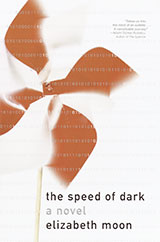Oh what an incredibly touching an profound book this is by Elizabeth Moon. A long time ago, I read her other non-series book, Remnant Population, and really liked it, but never read any other books by her. Sister-in-law Joan recommended this one and I am so glad to have read it. Set just a few years into the future, childhood autism has become a think of the past due to genetic tinkering in the womb or shortly after birth. However, that leaves the existing adult autists rather out in the cold. Some of them received early training to learn enough compensatory skills to get by in society. One of these is our protagonist and narrator, Lou Arrendale. He lives on his own, drives a car, and has a good job with a pharmaceutical company, where his pattern recognition skills are providing a valuable service. In fact, there is a whole unit of adult autists working for the company in this capacity. The company receives a tax credit, and the autistic employees are given a specially supportive environment to facilitate their high productivity. But along comes a new regional manager who detests them and all they represent and he is determined to get rid of them. He essentially tells them that they can become subjects in an experimental treatment to "cure" adult autism or risk losing their jobs. Their immediate supervisor, who has a more severely impaired autistic brother, seems--initially--unable to protect them, although eventually he succeeds in revealing and stopping this ruthless manager's illegal plans.
A parallel story occurs in Lou's private life wherein he is attracted to a woman, Marjory, in his small fencing class that meets once a week. Lou has become so adept at fencing that his teacher persuades him to participate in a tournament, where Lou does very well. But another member of the group, Don, hates Lou for his success and because Marjory seems to favor Lou over him. Don begins to do malicious deeds like slash Lou's tires and break the windshield on his car. When Don rigs a small explosive device to Lou's car, the police finally begin to take the events seriously and manage to catch the perpetrator when he tries to shoot Lou.
All these events serve to give the reader insight into Lou's ways of viewing human interaction and dealing with the "normal" people around him. The really profound questions have to do with what normal really means, and whether or not Lou would lose his identity if he agreed to the experimental treatment and was no longer autistic. Lou is an absolutely compelling character, given real credibility by the fact that author Moon has a teenaged son with autism. You will empathize with Lou's concerns, fear for his safety and his future self, and cheer when he prevails. Highly recommended!
A parallel story occurs in Lou's private life wherein he is attracted to a woman, Marjory, in his small fencing class that meets once a week. Lou has become so adept at fencing that his teacher persuades him to participate in a tournament, where Lou does very well. But another member of the group, Don, hates Lou for his success and because Marjory seems to favor Lou over him. Don begins to do malicious deeds like slash Lou's tires and break the windshield on his car. When Don rigs a small explosive device to Lou's car, the police finally begin to take the events seriously and manage to catch the perpetrator when he tries to shoot Lou.
All these events serve to give the reader insight into Lou's ways of viewing human interaction and dealing with the "normal" people around him. The really profound questions have to do with what normal really means, and whether or not Lou would lose his identity if he agreed to the experimental treatment and was no longer autistic. Lou is an absolutely compelling character, given real credibility by the fact that author Moon has a teenaged son with autism. You will empathize with Lou's concerns, fear for his safety and his future self, and cheer when he prevails. Highly recommended!

No comments:
Post a Comment